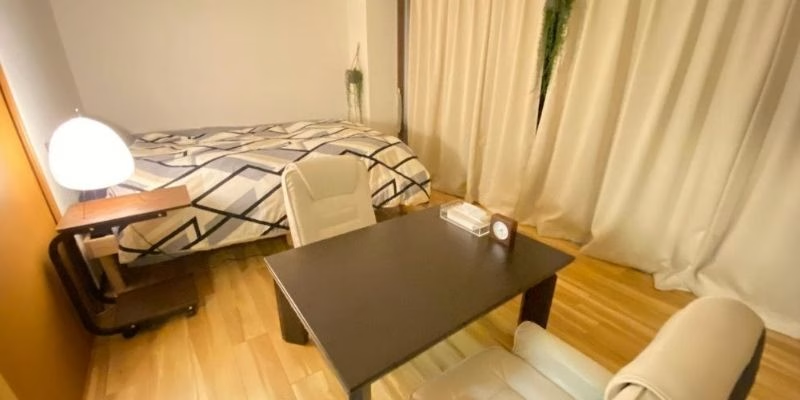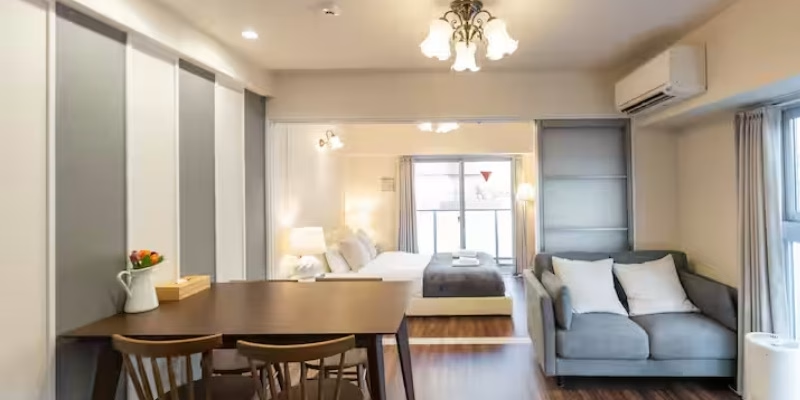The dream of living in Japan, whether for work or study, often encounters a formidable hurdle. The steep initial expenses associated with securing housing are challenging. For expatriates, understanding the local rental market is the first critical step toward a smooth transition. Securing a Low Initial Cost Rental Japan is not merely a possibility. It is an attainable goal. You can achieve this if you approach the market with the correct knowledge and resources. This comprehensive guide provides foreigners with the definitive strategy. It helps minimize upfront costs and defines crucial terminology. It also highlights solutions for foreigner friendly apartments Tokyo and beyond. We establish, unequivocally, that high initial costs are an avoidable barrier.
Low Initial Cost Rental Japan
Securing a Low Initial Cost Rental Japan fundamentally involves minimizing substantial, one-time payments. These payments are required before an expatriate receives the apartment keys. Traditionally, a standard rental contract in Japan demands an initial outlay equivalent to four to six months of rent. This figure is universally consistent across major metropolitan areas, including Osaka, Nagoya, and the competitive market of rent in Tokyo. Successfully achieving a low initial cost environment depends on eliminating or severely reducing major upfront costs. These costs include Key Money, Security Deposit, and the Guarantor Fee.
The Financial Barrier: Traditional Upfront Fees
The Japanese rental system relies on a rigid structure of initial fees that often surprise and deter foreign tenants. These fees are historically rooted in cultural practices and legal requirements. Examples of these significant upfront obligations include:
- Key Money (Reikin): This is a non-refundable, gratuitous payment to the landlord. Historically, it was an expression of gratitude. Today, it is simply a mandatory financial requirement that often equals one to two months’ rent.
- Security Deposit (Shikikin): This is a refundable amount. The landlord holds this to cover potential damage beyond normal wear and tear. It also covers unpaid rent. It typically costs one to two months’ rent.
- Agency Fees: These fees compensate the real estate agent for brokering the deal. They generally cost one month’s rent plus consumption tax. The consumption tax is currently 10%.
These requirements create a significant barrier to entry if an applicant only considers traditional Japanese-style properties.
No Key Money Apartment Japan: The Cost-Saving Solution
The modern rental market offers a specific and targeted solution: the no key money apartment Japan. These properties directly address the most substantial non-refundable charge. A “No Key Money” property eliminates the Reikin component, immediately reducing the initial cost by 20% to 30%. Many property management companies now offer no key money apartment Japan options. These options also waive the security deposit. They are known as Zero-Zero properties, or Shikikin/Reikin Nashi. These properties are becoming increasingly prevalent, especially in high-demand areas.
To provide a concrete, real-world example, let’s examine the initial cost breakdown for the property “Jr. Sakuranoki Terrace” in Kamimeguro, Meguro-ku. It has a monthly rent of ¥220,000. There is an additional ¥6,000 in Maintenance/Other fees, totaling ¥226,000 per month.
The property listing details show it is a Zero-Deposit (Shikikin Nashi) apartment. It also has No Key Money (Reikin Nashi). This aligns perfectly with the goal of Low Initial Cost Rental Japan.
| Initial Fee Component | Amount | Type | Impact on Upfront Cost |
| Rent | ¥220,000 | Monthly (First Month) | Standard Cost |
| Maintenance Fee/Other | ¥6,000 | Monthly (First Month) | Standard Cost |
| Deposit | ¥0 | Shikikin Nashi (Zero-Deposit) | Major Saving |
| Key Money | ¥0 | Reikin Nashi (No Key Money) | Major Saving |
| Agency Fee | ¥242,000 | Non-refundable | Standard Brokerage Cost |
| Guarantee Fee | ¥180,000 | Non-refundable | Mandatory Safety Net |
| Fire Insurance | ¥18,000 | Non-refundable | Standard Cost |
| Other Initial Fee (Lock Exchange/etc.) | ¥22,000 | Non-refundable | Minor Cost |
| Total Move In Fee | ¥687,000 |
In this example, the apartment is in a central, desirable area of Tokyo (Meguro-ku). Despite the high monthly rent, it is still a Zero-Zero property. The initial cost is significantly lower. The cost would increase if the tenant had to pay 1-2 months of Key Money (¥220,000 – ¥440,000). Additionally, it would rise with 1-2 months of Security Deposit (¥220,000 – ¥440,000).
The True Cost Breakdown: Understanding Japanese Rental Fees
A successful expatriate must grasp the precise nature of each required payment to accurately budget for their move. The initial costs are not homogenous; they comprise both refundable and non-refundable fees. We definitively categorize these expenses below.
Key Money (Reikin): A Non-Refundable Expense
Reikin, or Key Money, is the most distinctive element of the Japanese rental contract. It represents a permanent financial loss to the tenant. The owner of the property retains this money absolutely. The amount is negotiable in certain circumstances if the property has been vacant for an extended period. However, tenants must always assume it is a fixed, non-refundable cost unless the contract explicitly states otherwise. Eliminating this fee is the single most effective action in achieving a Low Initial Cost Rental Japan.
Security Deposit (Shikikin): The Refundable Fund
The Shikikin, or Security Deposit, serves as collateral for the landlord. This fund is primarily used to cover two specific liabilities. The first is the cost of cleaning and repairs that exceed normal wear and tear upon lease termination. The second is any outstanding rent. Crucially, the Shikikin is theoretically refundable. However, landlords usually deduct a “cleaning fee” when tenants exit. This fee can range from ¥30,000 to ¥50,000 for a standard studio apartment. Tenants must document the apartment’s condition meticulously if they wish to recover the maximum amount possible.
Guarantor Company Fees: The Necessary Safety Net
Most landlords require a Guarantor for the tenant. For foreigners, securing a personal guarantor is extremely difficult. This leads to the mandatory use of a specialized Guarantor Company (Hoshō Gaisha). The initial fee for this service typically equals 50% to 100% of one month’s rent, plus a smaller annual renewal fee (e.g., ¥10,000 to ¥20,000). This company is not a refundable cost. It is a necessary intermediary that provides security to the landlord if the tenant defaults on rent. Therefore, it is a non-negotiable component for most properties. Specialized companies that manage foreigner friendly apartments Tokyo often have streamlined, lower-cost guarantor company agreements.
Agency Fees (Chūkai Tesūryō): The Brokerage Cost
The Agency Fee, or Chūkai Tesūryō, compensates the real estate agent for their services. Japanese law stipulates that the most an agency can charge a tenant is one month’s rent plus tax. This excludes the landlord’s portion. This fee covers the essential services, including finding suitable properties, negotiating the contract terms, and preparing the necessary legal documentation. You should expect this charge. Direct rental from the management company or landlord is rare for apartment for rent Japan listings found online.

Strategies for Securing Low Initial Cost Rental Japan
A strategic approach is imperative for minimizing the initial financial burden. Tenants must actively seek out specific types of properties and leverage specialized agencies.
Targeting Zero-Zero Properties
Zero-Zero properties are those that explicitly advertise ReikinNashi (No Key Money) and ShikikinNashi (No Security Deposit). Finding these units should be the primary focus for any prospective tenant seeking a Low Initial Cost Rental Japan. These properties occasionally have slightly higher monthly rents or higher renewal fees. This compensates the landlord for the lost upfront capital. However, the immediate financial benefit outweighs the long-term marginal cost. This is especially true if the tenant requires maximum upfront savings. These properties are often listed by major national housing providers, such as UR Housing or large property management corporations.
Focusing on Foreigner-Focused Real Estate Agencies
Traditional Japanese real estate agents (e.g., those found near train stations) often lack the English-speaking staff and the specialized knowledge required to process foreign applications, especially for those without a long-term visa or established employment history. Agencies specializing in the international market, such as those that advertise foreigner friendly apartments Tokyo, are crucial. These specialized firms understand the unique documentation requirements. They actively manage portfolios of properties where landlords are pre-vetted to accept foreign tenants.
- Specific Benefits: These agencies help with setting up utilities. They often offer bilingual contract explanations. They also have established relationships with foreigner-friendly guarantor companies. For example, they offer properties near international schools, university campuses, or major business districts popular with expatriates.
Considering Alternative Housing Models
Traditional apartment leases are not the only option. Different models offer a significantly lower barrier to entry.
- Shared Housing (Guest Houses/Share Houses): These properties typically need only one month’s rent and a small deposit/admin fee. They are an excellent transitional housing choice if a tenant needs immediate, affordable accommodation while settling into the country.
- Serviced Apartments: While the monthly cost is higher, the starting cost is minimal—usually just the first month’s rent. These are fully furnished and include utilities, making them an ideal short-term solution for new arrivals.

Apartment for Rent Japan: Specialized Housing Options
The broader market for apartment for rent Japan offers diversity. Yet, specific regional knowledge is key to securing an affordable deal.
The Role of Shared Housing (Guest Houses)
Shared housing is commonly known as Guest Houses or Share Houses. It shows the lowest starting cost entry point into the Japanese housing market. It offers an affordable housing choice. They are primarily designed for temporary residents, students, and young professionals.
- Benefits: They are fully furnished, utilities are included in the monthly rate, and the contracts are flexible (often month-to-month). This model completely bypasses the traditional Key Money and Security Deposit structure. It is the most direct route to Low Initial Cost Rental Japan.
Tokyo and Beyond: Specific Market Insights (Rent in Tokyo)
The high demand for rent in Tokyo often leads to higher average beginning costs. This is especially true in central wards like Shibuya, Shinjuku, and Minato. Nonetheless, achieving a low starting cost rental is possible. You can target Zero-Zero properties (Shikikin Nashi/Reikin Nashi) even within the metropolis.
This list highlights actual examples of Zero-Zero properties in and around central Tokyo. These examples illustrate the cost-saving potential of this strategy. This approach is used instead of detailing regional differences.

Arealty: Your Expert Partner in Finding Foreigner Friendly Apartments Tokyo
Successfully navigating the complexities of the Japanese rental market requires specialized expertise. Securing a Low Initial Cost Rental Japan involves detailed understanding. Finding genuinely foreigner friendly apartments Tokyo is also challenging. Arealty is a premier, bilingual agency established specifically to bridge the cultural and linguistic gaps that international tenants face. We keep an extensive, curated database of properties. These properties have landlords who consistently welcome foreign residents. This commitment separates us from general-purpose agencies.
Zero Key Money and zero Security Deposit options are our specialty, ensuring your transition to life in Japan is financially sound from the very beginning.The application process is meticulously simplified, removing common bureaucratic hurdles for you. All essential communications with the guarantor company are handled entirely by our team, saving you time and stress. Furthermore, a comprehensive contract review is provided in your preferred language, ensuring complete understanding and transparency before you sign.
Contact Arealty today to begin your search for the ideal apartment for rent Japan. Secure your low-initial-cost home if you use our specialized portfolio and expert guidance. We guarantee a transparent, efficient, and successful leasing experience.
Conclusion
Achieving a Low Initial Cost Rental Japan is possible. Tenants can use the specific strategies outlined in this guide to succeed. Focus on no key money apartment Japan listings. Focus on properties advertised as Zero-Zero. Partner with a specialized, bilingual agency. Doing so can reduce the daunting starting expense by over 60%. The dream of securing foreigner friendly apartments Tokyo is achievable with meticulous planning. It is also achievable with informed decision-making. Approach the market with confidence, knowing that the most significant financial barriers are avoidable.






Leave a Reply